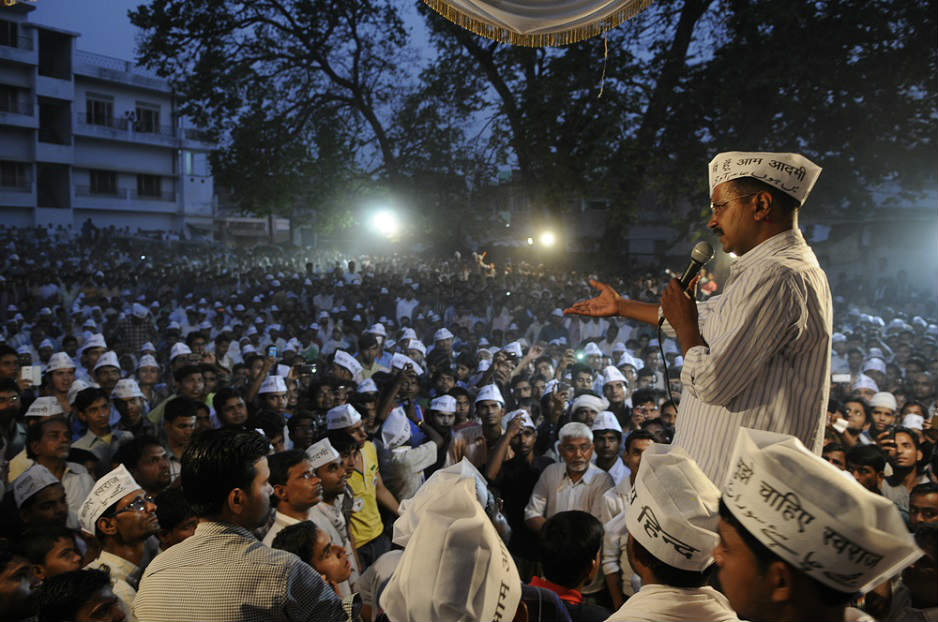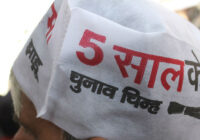The BJP’s rout in Delhi should serve as a wake-up call for the party and the prime minister.
In India, the Aam Aadmi Party (AAP) swept the Delhi state assembly elections, winning 67 seats out of 70, with the Bharatiya Janata Party (BJP) securing the remainder. The elections were held on February 7 and the results announced on February 10.
Amazingly, the BJP’s chief ministerial candidate, Kiran Bedi, lost from the Krishna Nagar constituency, a party bastion since 1993, by over 2,000 votes. AAP Chief Arvind Kejriwal is expected to take his oath as Delhi’s chief minister on February 14.
Whether one likes Kejriwal or not, there is no denying that this is a pivotal moment in his political career, and a testament to his dogged efforts to return to politics after he resigned from the post in frustration over stalled anti-corruption legislation in 2014. This latest win clearly suggests that Delhi’s voters were keen to give Kejriwal another chance.
So why did the AAP win so overwhelmingly, especially after his abrupt abandonment of the post? I spoke with several voters across Delhi on the eve of the parliamentary elections. Most of them who voted for the Aam Aadmi Party in 2013 were miffed that Kejriwal resigned. They believed he had become power-hungry, despite all his pretentions to good government. Although they agreed that he did good work as chief minister, many viewed his resignation as an act of desertion. It was clear from the start of the latest election that Kejriwal was in for a rough ride. But he handled the difficult phase rather masterfully.
I recall a discussion with an AAP spokesperson in 2014 while covering the Haryana state elections. He said that the AAP would not contest the Haryana polls and would instead focus on Delhi. This was one of the most pragmatic decisions the party took since its inception in 2013. Similarly, Kejriwal admitted that he was mistaken when he resigned after only 49 days, which is a rare occurrence in Indian politics.
The BJP’s cautious approach to the Delhi elections worked in the AAP’s favor. If Delhi had gone to the polls within six months of Modi’s stunning victory in the 2014 general elections, it would have been a very different story, with a likely happy ending for the BJP. The party’s delay in going ahead with the elections gave the AAP time to pick itself up and be seriously competitive.
It is no secret that the Delhi BJP has been mired with factionalism and infighting. The absence of a strong, unifying leader in the organization’s city branch prompted it to rush Bedi into the race for chief minister. Until her induction into the party, the BJP wasn’t even sure who to select to run for the post. The party’s central leadership took control to ensure that the fragmented Delhi unit did not thwart any chances of victory. Indian Prime Minister Modi remained the face of the campaign in Delhi and the BJP tied Bedi’s campaign to him. Political posters across the city featured her and Modi. The party “sidelined” Delhi BJP Chief Satish Upadhyay and did not field him in the elections.
But Bedi was brought in too late. Her arrival caused more discontent in the BJP’s already fragmented organization. Bedi had a reputation of being a no-nonsense police officer, and some leaders in the party perceived her as dictatorial. Similarly, voters saw Bedi’s introduction as a last-gasp move rather than a carefully crafted strategy.
However, her arrival was met with some positive responses. For instance, several female voters told me that she would improve women’s safety in Delhi. Even the AAP acknowledged that Bedi was “the strongest face the BJP has put up.”
But the AAP successfully framed her candidacy in a negative light. I saw AAP posters on several auto-rickshaws in the city describing her last-minute membership in the BJP as opportunistic. Whether or not one agrees with them, the posters achieved what the AAP wanted: many voters saw Bedi’s joining the BJP as a calculated move.
But what does this result mean for the BJP and Indian politics in general? Should the Delhi election be seen as a decline in Prime Minister Modi’s leadership and popularity?
I don’t think so. Modi’s “honeymoon” period as prime minister will go on for a while despite the setback in Delhi. However, the AAP’s victory has showed the BJP is not invincible. Its loss in this election will embolden regional parties. The BJP cannot rely on the “Modi wave” alone to win future elections.
The BJP has resembled the Congress Party since coming to power. Just like Sonia and Rahul Gandhi control the Congress, Modi and BJP President Amit Shah seem to have the last word on everything. Power concentrated in Modi and Shah’s hands could lead to dissent and discontent within the party rank-and-file.
Modi’s performance as prime minister has not been that spectacular so far, but he needs more time. The BJP’s rout in Delhi should serve as a good wake-up call. If Modi doesn’t deliver what he promised, people will vote him out.
We bring you perspectives from around the world. Help us to inform and educate. Your donation is tax-deductible. Join over 400 people to become a donor or you could choose to be a sponsor.
The views expressed in this article are the author’s own and do not necessarily reflect Fair Observer’s editorial policy.
Photo Credit: Arindambanerjee / Shutterstock.com
Support Fair Observer
We rely on your support for our independence, diversity and quality.
For more than 10 years, Fair Observer has been free, fair and independent. No billionaire owns us, no advertisers control us. We are a reader-supported nonprofit. Unlike many other publications, we keep our content free for readers regardless of where they live or whether they can afford to pay. We have no paywalls and no ads.
In the post-truth era of fake news, echo chambers and filter bubbles, we publish a plurality of perspectives from around the world. Anyone can publish with us, but everyone goes through a rigorous editorial process. So, you get fact-checked, well-reasoned content instead of noise.
We publish 2,500+ voices from 90+ countries. We also conduct education and training programs
on subjects ranging from digital media and journalism to writing and critical thinking. This
doesn’t come cheap. Servers, editors, trainers and web developers cost
money.
Please consider supporting us on a regular basis as a recurring donor or a
sustaining member.
Will you support FO’s journalism?
We rely on your support for our independence, diversity and quality.








Comment